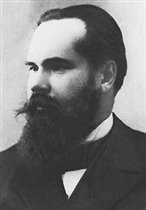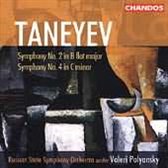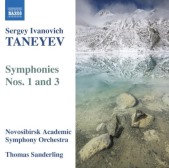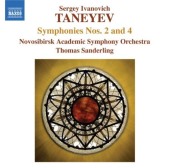 A little bit about the composer
A little bit about the composer
Born: 1856
Died: 1915
Sergei Ivanovich was born into a distinguished family which included his uncle the court chamberlain and amateur composer Alexander Taneyev. He showed musical talent very early and entered the Moscow Conservatory at the age of nine. Here he studied piano with Nicholas Rubinstein and composition with Tchaikovsky, who would become one of his closest friends. Taneyev later became professor of composition and theory at the Conservatory himself and numbered Rachmaninoff, Medtner, Arensky and Gliere among his pupils. He was one of the first nineteenth century musicians to rediscover the works of the composers of the great age of Polyphony and was himself internationally known for his contrapuntal ability. In addition to his symphonies Taneyev wrote several other orchestral works, cantatas, an opera trilogy, and nineteen great chamber works.
How many are there?
There are four symphonies:
Symphony No. 1 in E-Minor (1873-4) published 1948.
Symphony No. 2 in B-flat Minor (1877-8; incomplete) published 1977.
Symphony No. 3 in D-Minor (1884) published 1947.
Symphony No. 4 in C-Minor Op. 12 (1901).
As can be seen Taneyev did not publish the first three symphonies (hence No. 4 formerly being known as No. 1) and the works only came into circulation long after his death.
I will like these works if…
Melodically the Taneyev symphonies hew closer to the style of Borodin, Glazunov and Kalinnikov than to that of the composer’s friend Tchaikovsky. That said, the energy and sweep of the Russian school is combined with the composer’s great contrapuntal knowledge, a neo-classical type of scoring and a Brahmsian seriousness - the latter not usually found among 19th century Russian symphonies. This unique combination of features has given Taneyev the reputation of a “connoisseur’s composer” in Russia and precluded easy classification for Westerners.
Which one should I start with?
The most immediately attractive is probably Symphony No. 2. Taneyev was only a name to me when I picked up a Melodiya LP of this piece, conducted by Vladimir Fedoseyev, at Foyles many years ago. In spite of less than sterling sound quality I could tell that the first movement had a sweep and vitality equal to the best Russian symphonies of the period. The more recondite slow movement gradually revealed a unique sense of thematic development and the scherzo had a verve that was immediately attractive. The second remains my favourite of the four symphonies today.
What next?
The first symphony is an amazing accomplishment for a 16 year old - in many ways the equal of many symphonies by Taneyev’s adult contemporaries. The third takes longer to make an impression but features an excellent slow movement and finale. Last is the fourth, which combines all of the elements of the composer’s musical personality into a final, comprehensive statement.
Both Valery Polyansky, with the Russian State Symphony, and Thomas Sanderling, with the Novosibirsk Academic Symphony, have recorded all four symphonies, the latter part of a never completed series of the composer’s complete music with orchestra. Sanderling is sometimes the more exciting while Polyansky has a greater grasp of the composer’s overall symphonic structure. However, the Chandos discs have superior recording and this, combined with the playing of the Russian State Symphony, make Polyansky’s the discs to get.




After the symphonies listeners interested in further exploring the composer’s output may want to try the Concert Suite for Violin and Orchestra Op. 28 or the Oresteia Overture Op. 6 (actually a symphonic poem based on themes from the opera) or his many chamber works.
Reviews of Taneyev symphonies
Symphonies 1 & 3
Polyansky/Chandos CHAN10390 [
review]
Sanderling Naxos 8.570336 [
review] [
review]
Symphonies 2 & 4
Polyansky/Chandos CHAN9998 [
review]
Sanderling Naxos 8.572067 [
review]
Symphony 4
Svetlanov/SVET 93-96/4 [
review]



 All Nimbus reviews
All Nimbus reviews








